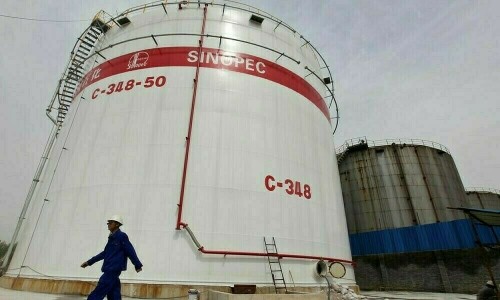Sinopec’s Q1 Profit Declines Amid Lower Oil Prices
Singapore: Sinopec Corp of China announced a 27.6% decrease in first-quarter profits compared to the previous year. The company attributed this downturn to reduced oil prices and challenges faced by its refining operations, including declining fuel sales and narrow profit margins.
China Petroleum & Chemical Corp, known as Sinopec, reported a net income of 13.26 billion yuan ($1.82 billion) for the period of January to March. The data was disclosed in a filing with the Shanghai stock exchange, adhering to Chinese accounting standards.
The consumption of gasoline in China, a major global consumer, is increasingly susceptible to competition from electric vehicles. Furthermore, diesel demand is being hampered by the country’s ongoing economic difficulties.
Sinopec, which has the largest refining capacity globally, noted that overall refined fuel demand in China experienced a 4% year-over-year reduction during the initial three months of the year.
The company’s crude oil processing volume saw a 1.8% decrease during this time, totaling 62.13 million metric tons, which is equivalent to 5.04 million barrels daily.
Total sales of refined fuel products fell by 7.1%, reaching 55.59 million tons. This figure encompasses domestic sales, which amounted to 43.2 million tons, reflecting a 5.3% decrease compared to the prior year.
Sinopec’s output of ethylene, an essential component for petrochemical production, increased by 17.7% to 3.86 million tons, recovering from declines observed in the same period over the past two years.
However, the chemical division reported a quarterly loss of 1.32 billion yuan, citing a “challenging market environment characterized by persistently low margins.”
Crude oil production experienced a slight decrease of 1.2% year-on-year, totaling 69.53 million barrels (approximately 773,000 bpd), whereas natural gas production increased by 5.1% to 368.4 billion cubic feet.
Capital expenditure was recorded at 18.25 billion yuan, down from 20.5 billion yuan in the previous year. A significant 70% of this investment was directed towards the upstream department to facilitate oil project developments, including Jiyang in eastern China, Tahe in the northwest, and the Fuling shale gas project in southwestern China.
Sinopec’s shares traded in Hong Kong closed with a 0.25% increase, despite an 11.5% loss since the beginning of the year.



Comments (0)
No comments yet. Be the first to comment!
Leave a Comment